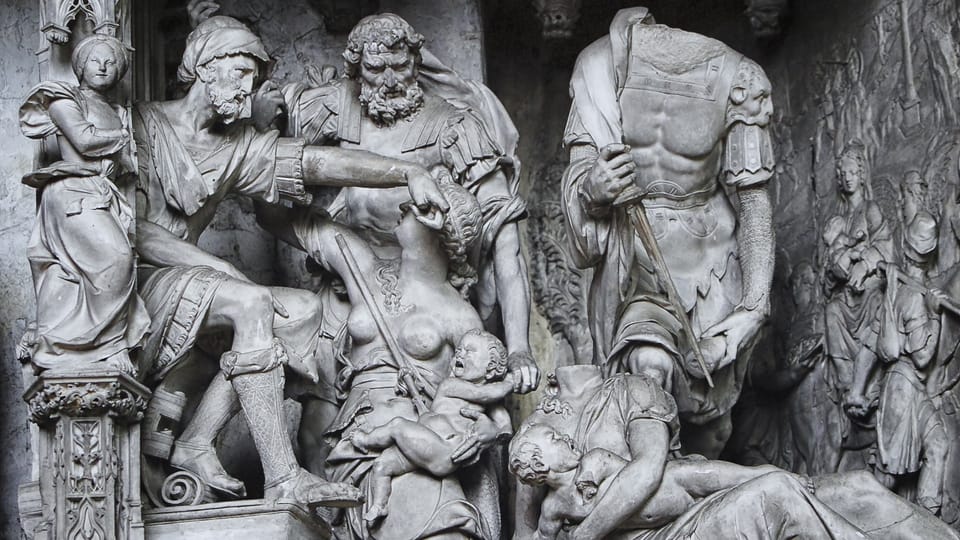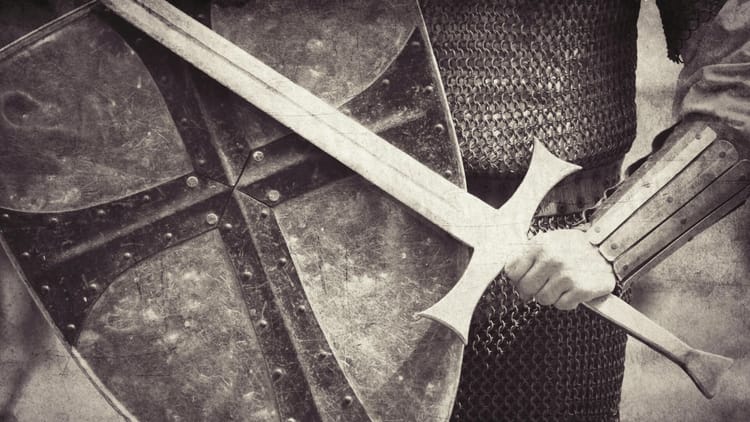A Clash of Kingdoms (Matthew 2:1-18)

Recently on Sundays, we have been examining a significant yet gloomy book of the Bible. Last week we looked at one of the most disturbing stories in all of Scripture. You have this sense that you're glad it's over.
After the service somebody came up to me and asked, "What are you preaching on next week? I hope it's going to be a bit lighter than this." I just realized we're talking about Herod's killing of children aged two and under in Jerusalem. I promise you it will get lighter, just not this week.
N.T. Bishop Wright, a respected religious leader in the Church of England and renowned theologian, delivered a sermon at a large Christmas service. A famous historian was present at the event. This historian was well-known for his skepticism towards Christianity, but his family had persuaded him to attend the service.
Afterward, this historian approached N.T. Wright with a big smile. "I've finally worked out why people like Christmas," he said.
"Really?" said Bishop Wright. "Do tell me."
"A baby threatens no one," the historian said, "so the whole thing is a happy event which means nothing at all."
That historian may not have read the Christmas story of the Bible. At the heart of the Christmas story is a baby who poses such a threat to the most powerful man around that he kills a whole village of young children to try to get rid of him. He is most definitely a threat to the kingdoms of this world, kingdoms that are in direct competition with his reign.
The passage we read today presents us with a conflict that becomes a major theme in the life of Jesus. It's a theme that continues today.
On one hand you have the empire that is threatened by Jesus. What is possibly threatening about a baby? What is threatening is that even a baby is a threat when that baby is a king who will possibly dethrone the reigning powers. When a baby is born who is a rightful heir to the throne, and the person on the throne is a poser, then it makes sense for the illegitimate monarch to be threatened.
King Herod was such a ruler. Herod, otherwise known as Herod the Great, had overcome all kinds of competition and obstacles to become king of Judea. He was famous for his building projects, including the rebuilding of the Temple in Jerusalem, which was absolutely stunning, as well as theaters, amphitheaters, monuments, pagan altars, and fortresses. If you go to Israel today, you can still see remnants of what he built.
Some people think that he was one of the richest men to ever have lived. Although he had faced many threats to his power, he was able to overcome them all because he was both ruthless and powerful.
Why would a man who accomplished so much be threatened by a baby? There was a problem with Herod – actually a number of problems. Although Herod considered himself to be Jewish, he was not a descendant of Jacob; he was a descendant of Esau, or an Edomite. God had told Jacob in Genesis 35:10, "Your name is Jacob, but you will no longer be called Jacob: your name will be Israel." But Isaac, Esau's father, predicted that Esau's descendants would serve Jacob's (Genesis 27:40). The Israelites in Herod's day did not believe that Herod had any right to the throne in Israel because they did not consider him to be Jewish. In 40 BC, someone took the throne away from Herod, and Herod asked Rome to help him. So he was elected "King of the Jews" by the Roman Senate, took back the throne, and consolidated his reign for another 34 years.
So when ancient astrologers show up from the east – the east, by the way, was where Herod was most exposed to foreign threats, and these astrologers were connected to power – when these astrologers show up and announce that a king of the Jews has been born, Herod has every reason to be threatened.
There are lots of theories about what exactly the astrologers saw. Barth mentioned to me last week the work of one astrologer. Evidently they can go back using computers now and recreate the arrangements of the planets on any given date. Supposedly in astrology that day, Aries was a symbol of Judea, and Jupiter was and is connected with royalty. Ancient astrologers believed that a new king would be born when the moon passed in front of Jupiter. This would signal the birth of a great new king in Judea. On April 17, 6 BC, Jupiter was eclipsed in the east. A Roman astrologer described the conditions of that day as befitting the birth of a "divine and immortal" person.
This seems to make a lot of sense. No matter if you and I buy into this theory, something like this happened. Well-connected astrologers saw something that made them believe that an important king had been born in Judea. We read the results in verse 3: "When King Herod heard this he was disturbed, and all Jerusalem with him."
You don't want a man like Herod disturbed! He had no problem killing anyone – friend, family, or foe – to keep his grip on power. He had executed dozens of people who had been threatened, including his wife, three sons, mother-in-law, and uncle.
We read that all Jerusalem was troubled with Herod. Why were they troubled? For sure, they knew what happened when Herod got disturbed. When Herod was unhappy, everyone was unhappy. But I think it was probably more than that. You're talking about people in positions of power in Jerusalem, religious leaders who had aligned themselves with Herod. If his power base was threatened, so was theirs. They knew they were all in trouble if a rightful king had been born, the true king of the Jews.
You see, Christmas is about an extraordinary king who poses a threat to the kingdoms of this world. The baby Jesus is a threat.
And this is a theme that continues all throughout the gospels, including this one. You have the blind and the lame and the powerless people coming to Jesus, but the powerful elite indignant. You have the most powerful religious leaders of his day condemning Jesus of blasphemy. In Luke, we read that Herod's son, who took over part of his father's territory, ridiculed and mocked Jesus before his death. Jesus has always been a king who is a threat to the ruling kingdoms of this world.
That's true even today. About a year ago, a group of pastors got together. They actually began talking about how much they hate being pastors at Christmas.
You would think that a season that's all about one of the greatest theological truths – that God became flesh in what is called the incarnation – means that Christmas would be a great time to pastor. But the pastors had a sense of competing with stress, thoughts about the mall, what people hadn't bought yet, and how much debt they're going into for this great truth called the incarnation.
There's a stream of passion, consumerism and chaos that is contradictory to the message of the Gospels. Rick McKinley, one of the pastors in the group, observes, "There is a point where you want to just throw up your hands and say, 'Let's quit talking about Christmas from the Bible. Let's just talk about spending more. Let's cancel church for the Christmas season.' That probably would be easier for people. Then you realize that's stupid."
The pastors began to conspire together to enter the story of Christmas: not just teach about it and sing about it, but enter it. They thought: When Christ came to earth, he came as king. It threatened the king at the time and his empire. Although Christ comes in weakness, there is a true threat in this baby. He is subversive. He is a threat to the kingdoms and the powers that be in this world.
They began to ask if Jesus was still a threat to the powers of this world, and they began to realize that there is a rival kingdom to Jesus, but it's a kingdom that we often get sucked into.
When we worship at Christmas, we often bless the kingdom, and buy into consumerism and chaos. This seems contradictory to the Christmas story. While we are not living under Herod's reign, there is another empire of consumerism and materialism that threatens our faithfulness to Jesus. Jesus brought with him such an extraordinary kingdom that is counter-culture to the kingdoms of this world.
Part of saying "yes" to Jesus means that we say "no" to over-consumption. We say "no" to these things, so we can create space to say "yes" to Jesus and His reign in our lives. We want to live as subjects of the extraordinary king who is a threat, because there is a baby who is a king and who is a threat to the powers that claim to hold power in our lives. There is still a clash of kingdoms going on today.
So on one hand you have the empire that is threatened by Jesus, and the empire striking back. Sorry, couldn't resist. But on the other hand you have those who recognize this king's reign and accept Jesus as king. In verse 11 we read that these eastern astronomers came to the house, bowed down, and worshiped Jesus. They paid him homage, and presented him with the most valuable, transportable, and marketable items of the day, items that were ideal for sustaining Mary and Joseph in another country as refuges as would happen after these events.
Who would expect astrologers to be the ones to pay homage to Jesus? The most unlikely people became subjects in this rival kingdom - something that is still true today. It's always the most unlikely people.
I know what you are thinking. You may be thinking, "Are you going to tell me that if I buy gifts at Christmas that I'm just like Herod?" No, that's not what I'm going to tell you. If I did that I would be guilty of a new type of legalism. There are lots of people who don't give gifts at Christmas who are under Herod's rule, and I'm sure there are lots of people who give gifts who properly worship Christ at Christmas.
What I am going to tell you is this: a king has come, and that king is a threat not just to Herod thousands of years ago. Actually, what Herod faced is what every person who encounters Jesus Christ eventually faces. He is a threat. Our kingdoms may not be as big or as impressive as Herod's, but every person here – me included – has stuff they are trying to protect. They're good things, like family, accomplishments, relationships, position. These are good things, but we have this tendency to make them ultimate things. And when we make them ultimate things, they then clash with the kingdom of God, the kingdom that was proclaimed when the baby king was born in Bethlehem.
We are all Herod, trying to desperately hold on to good things. But here's the thing. Historians tell us that as these events took place, Herod was dying a painful death. The historian Josephus wrote that Herod's final illness was excruciating. Within three years of Jesus' birth, Herod was dead. The crazy thing is that Herod was desperately trying to hold on to a kingdom that wasn't his to keep anyway.
The question that we face this Christmas is that as we understand that a king has been born, and that this king, because of who he is, can ask anything of us — what is threatening about that? Where do you go, "I'll follow Jesus, but I need to protect that." In other words, what good things have you made ultimate things?
The real question this Christmas is whether you will lay aside your idols, your kingdom that won't last anyway, and worship the child who was born whose kingdom will last forever.
And by the way, could it be that the way that we answer this question will also change our buying and spending habits and the way that we celebrate the arrival of that king? How do we live every area of our lives in light one of the greatest events in history – the arrival of God in human form as king? That's the question that this story leaves us to wrestle with.
By the way, there is no way to give up our kingdoms unless we're captivated by a better kingdom. In the 1800s a Scottish preacher wrote a paper called "The Expulsive Power of a New Affection." He made the point that the only way to get rid of something that your heart loves, that you must have, is to have that affection expelled by an even greater affection. Have you ever wanted something until an even better model comes along? All of a sudden you can't be bothered with what, a day ago, you used to have. This also works spiritually. The only way you can be free of the love of your own little kingdom is to become captivated by the love of an even greater kingdom. The love of God's kingdom has expulsive power. Only when you give yourself to a better king will you be free from becoming a Herod, desperately holding on to what we can't keep anyway.
The only way we'll be able to give up our kingdoms and worship the true king is if we are captivated by the beauty of that king — the One announced by angels and stars, worshiped by shepherds and astrologers, loved by the powerless but hated by the powerful, crucified and rejected, and yet bearing our sins, risen again and reigning at God's right hand. When we really see him, that will change everything about how we live and who we worship.
Let's pray.
Father, our prayer is that you would let us see Jesus. We confess that we are like Herod naturally. We don't have kingdoms like his, but we naturally see Jesus as a threat, and we want to hold on out of fear of what we will have to give up.
But this Christmas let us see Jesus. And let us worship him. May we truly experience the power of Jesus coming to this world, and may that free us from all competing kingships. May that change the way we celebrate even Christmas.
Let us survey the king lying in the manger. Let us survey the wondrous cross. And may it change how we worship this Christmas. In Jesus' name, Amen.





